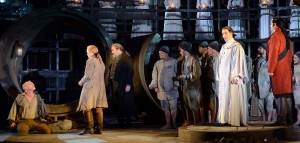Wormsley, 17 June 2014
John Cox’ deeply humane reading of Fidelio made a very welcome return to Garsington Opera in the more opulent surroundings of the Pavilion at Wormsley. The severe Panoptical set seems less cramped now, and the movement of the prisoners into the garden is a genuinely magical moment. On the evening we were present, the late sunlight was blazing from the East and as the prisoners emerged from the crypt the blinds along the side were raised so that the sun flooded the auditorium.
While the setting may be dominated by steel and concrete, there are constant attempts from the protagonists to humanise it. In the opening scene Jennifer France’s vivacious Marzelline is planting out in her tiny garden, a sign of optimism and hope. The prisoners are treated with dignity by Rocco’s family, making the later brutality of Pizarro and his henchmen all the more despicable. John Cox is not afraid to underline the Christian references in the text, and the symbolism of the bread, wine and chains falling off are pointed without over emphasis.
If the final scene lifts the whole evening closer to parable than naturalism, then this is in keeping with Beethoven’s optimism in the face of despair on both a personal and universal level.
The Garsington Opera Orchestra under Musical Director Douglas Boyd provided a strongly focussed and fast-paced account of the score, with some fine brass playing throughout. The chorus gave of their best and the subtle individuality of the prisoners is just enough to make us realise that they still maintain their personalities even though the system would wish to reduce them to mere numbers.
The revival is cast from strength with Rebecca von Lipinski and Peter Wedd returning from the original cast in 2009. Her Leonore is utterly convincing in both dramatic presence and voice. His characterisation as Florestan grows in strength as salvation approaches, though the opening aria seems laden with desperation rather than hope – an unusual but dramatically effective concept.
Darren Jeffery is a dominant bully as Pizarro and has the rasping voice to go with the character, in total contrast to the nobility of Joshua Bloom’s Fernando who, unusually for this opera, really does dominate the final scene.
Stephen Richardson’s Rocco is a convincing gaoler and sensitive to the needs of his family, his bluffness covering a deep concern for the prisoners in his charge. Sam Furness gave us a young and active Jacquino. There is no hint here that Marzelline will be getting second best when she realises Fidelio is a woman.
When I last saw this production at the old house in Garsington, I was present on the only evening which had to be abandoned because of the weather, when the battering of the storm blocked out the music and flooded the orchestra pit. No such problems today, and, we hope, never again!

